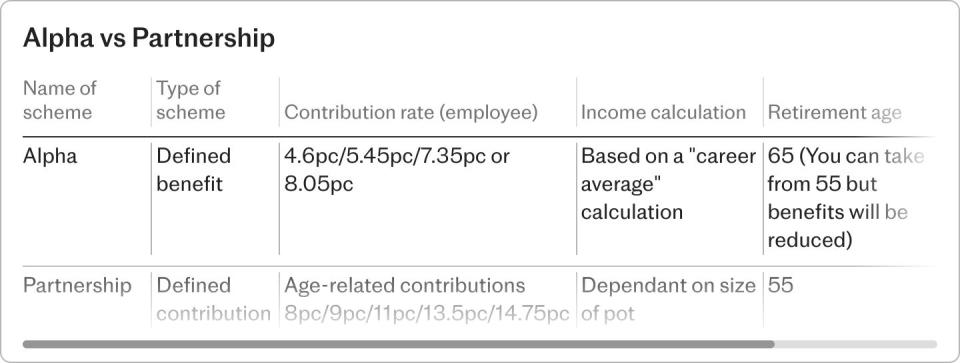How to get a job in the civil service

The primary role of the civil service is to advise and support the Government in delivering its policy. There are currently more than 500,000 civil servants and they are employed by the Crown.
Perhaps the most famous is Sir Humphrey Appleby, the legendary permanent secretary in the Department of Administrative Affairs and subsequently cabinet secretary in the BBC’s Yes, Minister. He who took it upon himself to frustrate any attempt at progress – and his hapless minister Jim Hacker – in order to maintain the status quo.
In his words, “The prime minister holds power. Ministers have responsibility. Fortunately, the civil service retains control.”
For his part, Mr Hacker called the civil service “the opposition in residence”.
Although Margaret Thatcher reportedly said the sitcom bore some semblance to reality, the civil service is required to deliver for the Government of the day.
It is politically neutral and members have to stick to the civil service code in order to “gain and retain the respect of ministers, Parliament, the public and its customers”. In return, they receive a range of perks, including job security, promotion prospects and a generous pension.
So, how do you join the ranks of Britain’s “Rolls-Royce” civil service? Telegraph Money takes you through how to follow in Sir Humphrey’s footsteps.
Where do civil servants work?
According to the Institute for Government, there were 510,665 civil servants in March 2024, 4.5pc more than the year before. This includes the UK government and the devolved Scotland and Wales governments, but not Northern Ireland.
Most work in policy, advisory and administrative roles within government departments, but some work in services provided by a specific department. For instance, prison officers are civil servants employed by the Ministry of Justice.
The Crown Prosecution Service is independent of the Government, but its employees are also civil servants. The same applies to staff at the Gambling Commission, the National Crime Agency and the DVLA, along with the Government’s security service GCHQ and many other well-known public bodies.
For this article, we will focus on the ones working for the civil service in government departments.
How much do civil servants earn?
Civil service pay can vary significantly, depending on the department, levels of skill and experience required and seniority of the job in question.
For instance, an administrative assistant at the Department for the Environment, Food and Rural Affairs would be paid £23,286 at current rates. When Mark Thurston stepped down as the chief executive of HS2, the high-speed rail project, his annual package was worth £677,000.
According to the latest figures from the Home Office, its lowest starting salary is £22,180. However, there is no requirement to start at the bottom – many people enter the civil service at higher levels, where the minimum salary will be clearly advertised on the job advert.
If you join the civil service’s graduate scheme, Fast Stream, you can expect a starting wage of £31,186. More on this later.
The most senior civil servant is the cabinet secretary, Simon Case, who is also head of the civil service. There are a range of promotion opportunities within a department, but many also switch departments for a more senior role.
However, due to the size and competition, it’s unlikely that promotions will simply be offered. Recruitment advisers suggest actively applying for multiple roles to get ahead.
Currently, around two thirds of all government-based civil servants work across just five departments.
Which qualifications are required?
A university degree might help you get ahead in certain roles, but the individual qualifications required should be listed on any job advert you see.
You don’t need a degree to work in every job. In fact, The Policy Officer Apprenticeship Standard is designed for people who haven’t been to university and it offers full-time work alongside a two-year learning and development programme.
There is also the Fast Stream, described as a “three-year accelerated career path to leadership with supported development”.
There are 15 different schemes to join, including commercial, finance or project delivery. However, you will need at least a 2:2 university degree to join, and a 2:1 for certain programmes.
How do you actually apply?
According to the civil service careers website, the most common route into the profession is via its online job finder.
It also says that name-blind recruitment is to be used for externally advertised jobs below the senior civil service, which is the Government’s executive leadership team. This means that applications need to be stripped of identifying information like your name, age and gender, along with your nationality, immigration status and which school or university you went to.
This was pushed by John Manzoni, the former Cabinet Secretary and chief executive of the civil service. At the time, he wrote: “Diversity is one of my key objectives. I am passionate about this agenda, because I believe that we must develop a civil service that reflects the public we serve.
“By removing the candidate’s name and other personal information, such as their nationality or the university they attended, we aim to ensure that people will be judged on merit and not on their background, race or gender.”
Exceptions can be made where there is a case to do so, such as for intelligence roles.
To make sure recruitment is done on merit, the process is also regulated by the Civil Service Commission.
Baroness Gisela Stuart, first civil service commissioner, said: “The Commission really encourages external recruitment recognising the need to bring in new skills and experience. We want candidates to know that recruitment is legally required to be open, fair and on merit.”
Are there any nationality requirements?
There are rules on who can work in the civil service. Anyone who’s a national of the UK, Republic of Ireland or a Commonwealth country would be eligible. Certain European Economic Arena, Swiss or Turkish nationals are too. This also applies to associations of these countries, such as a dependent territory.
There are sometimes other exceptions, which should be outlined on the job advert.
Only UK nationals may be employed in “reserved” posts. These are generally roles which, due to the sensitive nature of the work, require special allegiance to the Crown such that they can only be held by a UK national. This might include intelligence, national security or immigration.
Irish nationals and Commonwealth citizens are also eligible for employment in reserved posts if they were in the civil service at 31 May 1996 or before, or were appointed from a recruitment scheme with a closing date for receipt of applications before 1 June 1996.
What kind of experience and training is required?
Each job will outline the experience and training required. Given the vast range of jobs available, this varies significantly.
Ray’n Terry, of Totaljobs, a job listings platform, said: “Entry-level civil servants are subject to a training induction scheme, and all civil servants are entitled to at least five days of learning and development each year.”
How common is flexible working?
Flexible working is usually outlined in the job advert and features in most of them. It can include options like part-time working, job sharing and condensing hours to free up a day off during the week. Everyone has a legal right to ask their employer for flexible working, but there is no guarantee it will be successful.
Home working is also very common in the civil service, but it’s likely to vary by job, location and department. Generally, employees are required to spend 60pc of their time in the office.
Civil servants are among the workers most likely to favour working from home. It has also been a controversial issue since the Covid-19 pandemic, with ministers trying and failing to crack down on the practice.
HMRC in particular has received criticism for staff working from home. This has extended to expenditure on expensive new offices and equipment that staff are allegedly not using frequently.
Can you choose your working location?
Your working location will be clearly shown on the job you apply for. Some jobs offer the opportunity to work at a range of different sites.
As part of the Conservative government’s Levelling Up agenda, it has already moved more than 18,000 civil service jobs out of London. This is part of a target to move 22,000 from the capital to other areas of the UK by 2027.
Ms Terry added: “There is some degree of flexibility, with 80pc of job roles available outside of London. This allows for you to explore great opportunities even if you aren’t in the big city.”
What are the main perks?
A major benefit of working for the civil service is job security. Unlike employees who are beholden to the economic success of their employer, such as in a small business, the civil service is funded by the state.
Depending on where you work, you might also be eligible for a bonus, either as part of ongoing work or at the end of the year based on performance.
As already described, the civil service is generally open to flexible working – and comes with a generous pension (more on that below).
What are the worst parts of the job?
Members of the civil service point to the need to remain politically impartial, including restrictions on their own political activity, as something prospective employees should be prepared for.
Civil servants are also beholden to the decisions of ministers, who may have strong views despite a lack of knowledge or experience in the topic. It can also be difficult when what you’re required to do conflicts with your own personal beliefs.
Others point to bureaucracy and the difficulty in getting things done as a disadvantage.
How good is the pension scheme?
Alongside other public sector workers, civil servants enjoy pension scheme has been notoriously generous – with the public left to foot the bill for funding it. As part of a major shake-up of public sector pensions in 2015, the scheme for civil servants changed. When you join, you can opt for the alpha scheme or the partnership scheme.

The alpha plan is a career average “defined benefit” scheme where you make monthly contributions depending on the size of your salary. Regardless of the size of your contributions, the civil service adds 28.97pc. When you retire, you’ll get a guaranteed, inflation-linked income for life.
The partnership scheme is a “defined contribution” scheme, run by Legal & General. In this scheme, you don’t have to make contributions at all, but you can choose to. The civil service will add to your pot on your behalf and it’s invested. The employer contributions rise as a proportion of salary the older you get – under 31 the civil service will add 8pc of earnings, whereas those over 46 get 14.75pc.
Once you retire, you can access it in the same way you access a normal pension, such as buying an annuity, going into drawdown, taking the entire amount as a lump sum or a combination of those options.

 Yahoo Finance
Yahoo Finance 